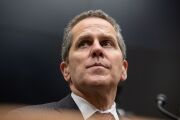
The Federal Reserve's chief regulator said his post banking crisis
Speaking during a conference on governance and culture in the financial services sector, Fed Vice Chair for Supervision Michael Barr said he will oversee an initiative to
"Over the next six months, we're going to do a project that looks systemwide at the areas where we can enhance our supervisory culture, our practices, our behaviors, ours tools and also where we need to change our regulation of firms," Barr said at the event, which was hosted by the Federal Reserve Bank of New York. "We're extremely focused on that."
Barr said the changes will be informed by three primary inputs. The first is the lengthy report compiled by Fed staffers about the failure of Silicon Valley Bank this spring — a six-week effort that
One potential change already being explored is the incorporation of a tool Barr referred to as "reverse stress testing." Unlike a traditional stress test, in which supervisors measure how a bank's balance sheet reacts to a fixed stressful scenario, they, instead, determine what kind of conditions a bank would have to face before failing to determine its greatest points of vulnerability.
"You obviously can then use that as a tool for looking at ways that a firm itself might be more resilient," Barr said. "And you can use it as an exercise to help you to free up the brain to think about things that are not inside the normal observed pattern."
The adoption of reverse stress testing is still a nascent idea within the broader supervisory reform effort, Barr said, but he noted that it embodies the Fed's goal of thinking outside the box about potential risks.
Barr said the Fed is also looking to financial regulatory regimes around the world for inspiration. He pointed to the U.K.'s focus on holding senior managers accountable and its practice of applying firm-level capital or liquidity requirements to address specific deficiencies. Barr noted that the latter set of actions falls under what is known in the Basel Regulatory Framework as "pillar 2" approaches, which regulatory experts say the Fed
He also noted that regulators in Australia and the Netherlands have made great strides in incorporating behavioral science to identify cultural deficiencies.
"There's a ton that we could learn from other jurisdictions," Barr said.
Barr also said his cultural reform effort will include a push for Fed supervisors to be swifter in identifying and addressing regulatory concerns. Doing so, he said, will require moving away from the institution's typical, deliberate pace.
"We tend to have a culture that really makes it difficult for the institution to act quickly with supervision. We try to build consensus. We want to make sure that our evidentiary reference is strong. We're an institution that focuses on process, but we're not an institution that moves quickly on supervisions," Barr said. "We're great in a crisis, but on supervisory issues, as an institution, we move more slowly."
New York Fed President John Williams, who shared the stage with Barr during the event, said Fed supervisors should focus more on the cultural tone being set by boards of directors at banks they supervise, noting that "we tend not to talk about boards of directors as much as we should."
Williams has overseen the New York Fed's Governance & Cultural Reform initiative since taking the top post at the reserve bank in 2018. The program was launched by his predecessor, William Dudley, to explore bank-level cultural failings in response to the 2008 financial crisis. Williams said a key mission of his is to not only highlight institutional failings, but also the successes of strong risk management cultures.
"Culture is not just about avoiding bad behavior," he said. "It's actually about conceptualizing and supporting and fostering good behavior to help the organization be successful on a sustained basis."
Because of this, the event highlighted successful cultural initiatives from outside the financial services sector, including nuclear operations and medicine. Many of the speakers came from the worlds of psychology and behavioral science — fields from which Barr and Williams said it could be helpful to draw as the Fed looks to diversify its supervisory staff.
"As an academic, some of the most important work that I did was in collaboration with a behavioral economist to look at ways that regulation and economics and psychology come together to form a full picture of the way in which financial decisions are made," Barr said. "Having interdisciplinary perspectives is really critical, and I would love to see us move the system to bring in interdisciplinary expertise to look at risk."







